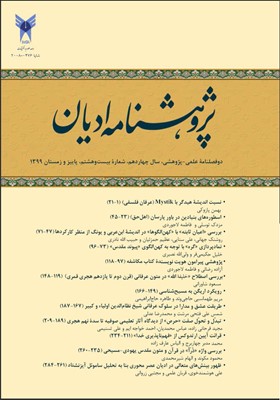پژوهشی پیرامون هویت نویسندۀ کتاب مکاشفه
محورهای موضوعی : مسیحیت
آزاده رضایی
1
,
فاطمه لاجوردی
2
*
![]()
1 - ادیان و عرفان تطبیقی، دانشکده الهیات، دانشگاه آزاد اسلامی، واحد علوم و تحقیقات، تهران، ایران.
2 - گروه ادیان و عرفان، دانشکدۀ حقوق، الهیات و علوم سیاسی، واحد علوم و تحقیقات ، دانشگاه آزاد اسلامی، تهران، ایران.
کلید واژه: آپوکالیپس, متون مکاشفاتی, مجعول نویسی, کتاب مکاشفه, یوحنّا, انبیا یهود, انبیا مسیحی,
چکیده مقاله :
متون آپوکالیپسی، به عنوان مجموعه متونی که مکاشفاتی را پیرامون رویدادهای فرجام جهان روایت می کنند، در سنتهای یهودی و مسیحی به لحاظ صورت و محتوا اشتراکات بسیاری زیادی با یکدیگر دارند. از جملۀ این ویژگی های مشترک، انتساب آپوکالیپسهای یهودی به نامدارترین شخصیتهای این دین نظیر موسی، توسط نویسندگان این گونه آثار به منظور اعتبار بخشی به آثارشان است، که اصطلاحاً مجعول نویسی خوانده میشود. نویسندگان آپوکالیپسهای مسیحی نیز همانند همتایان یهودیشان این روش را به کار بردند و آثار خود را به شخصیتهای مهم مسیحی نسبت دادند. ولی در این میان، کتاب مکاشفۀ یوحنّا یکی از نمونههای برجستۀ آپوکالیپسهای مسیحی است که نویسنده در آن به صراحت به نام خود یعنی یوحنّا به عنوان نویسندۀ اثر اشاره میکند. به همین سبب، از همان سدههای نخست تاریخ مسیحی مباحثات بسیاری پیرامون هویت این نویسنده در میان عالمان مسیحی شکل گرفت که تا عصر حاضر همچنان ادامه داشته است. نوشتار حاضر نشان می دهد که شناخت ما از هویت فردی یوحنّا امری تقریباً غیرممکن است، ولی با وجود این می توان به شناخت نسبتاً روشنی دربارۀ هویت اجتماعی یوحنّا در مقام یکی از انبیا مسیحی نخستین و نحوۀ فعالیت های دینیاش در حوزۀ جغرافیایی مخصوص به خود یعنی منطقۀ آسیای صغیر دست یافت.
The Apocalypses, as the writings which narrate the revelations about the occurrences of the finality of the world, have much in common in Judeo and Christian traditions in terms of form and content. One of their common features is pseudepigraphy, i.e. the attribution of the Jewish apocalypses to the most prominent Jewish figures including Moses, through which the real authors could have accentuated on the authority of their works. The authors of the Christian apocalypses, like their Jewish counterparts, attributed their works to the prominent Christian figures. Meanwhile, the Book of Revelation is one of the most significant Christian apocalypses that its author explicitly refers to his name, John, as the author of it. Thus, since the early centuries of Christian history, many discussions have been made concerning the identity of the author by the Christian thinkers, which have even continued until today. This article is seeking to present a clear picture of the identity of the author according to some historical accounts, the ideas of the early Christian thinkers and the ideas of the modern scholars. The present study indicates that John was one of the early Christian prophets who was engaged in his religious ministry in Asia Minor.
_||_

